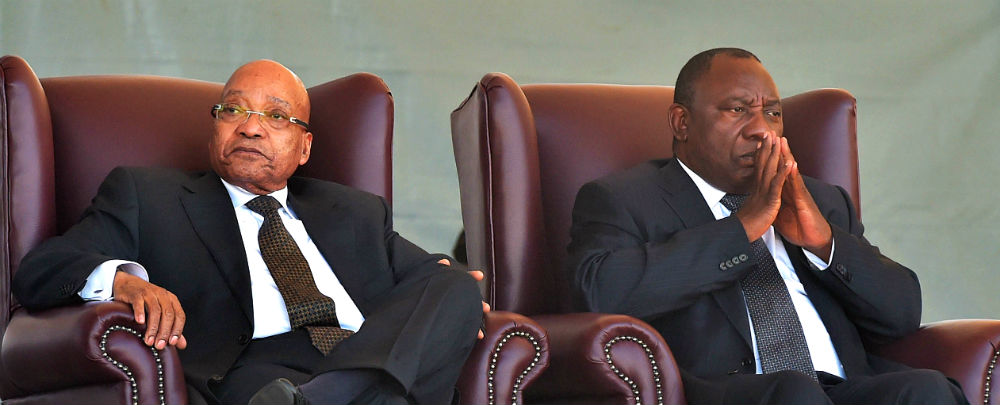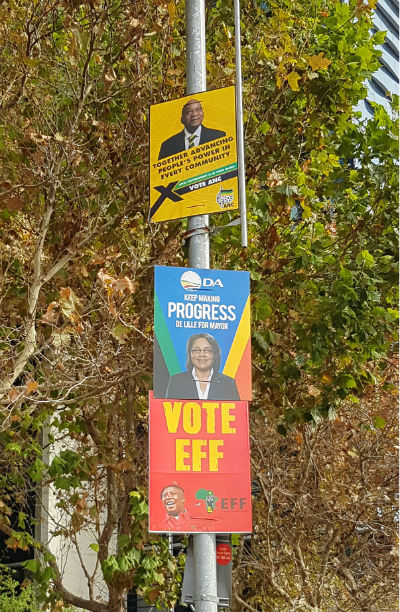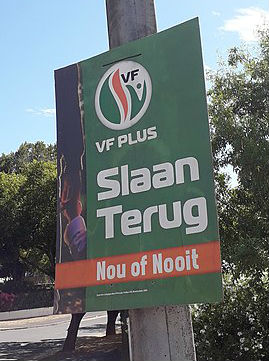
Jacob Zuma and Cyril Ramaphosa. (Photo: GCIS)
South Africa’s sixth elections since the end of apartheid have the potential to reconfigure South Africa’s political landscape. The ruling African National Congress (ANC) is embroiled in a fierce internal struggle over its future trajectory. Two factions are jostling for control: one aligned to the patronage-based ex-president, Jacob Zuma, and the other to his successor, President Cyril Ramaphosa, who is standing on a platform of reform, renewal, and accountability. Zuma’s loyalists support populist policies that resonate with the ANC’s constituency on the left, such as land expropriation without compensation and the nationalization of the South Africa Reserve Bank (or central bank). They are distrustful of Ramaphosa’s platform and have largely stayed away from major campaign events. Many Zuma-era politicians implicated in the ongoing judicial inquiry on state capture are the ANC candidates for parliamentary and provincial seats, fueling concerns that they will undercut Ramaphosa’s reform agenda if elected.
The ANC’s support has dropped to historic lows due the systematic diversions of state resources under Zuma, detailed in the State of Capture and Secure in Comfort reports. The leftist Economic Freedom Fighters (EFF), which broke away from the ANC in 2013, has made inroads in ANC strongholds and is now the third largest party in the country—despite also being the youngest. The perilous state of the ANC was laid bare in a damning internal report presented to the rank and file at the 54th National Conference in December 2017. Its overall strategic assessment of the party struck a somber note: “We are today faced with a painful challenge, where the entirety of the liberation movement is projected as corrupt.”
The Stakes
This election poses the most serious test yet of the stability of the ANC.
This election poses the most serious test yet of the stability of the ANC. In a poll conducted between May and June 2018, Ipsos found that 54 percent of South Africans agreed that “the future of the ANC is uncertain because of leadership issues in the party.” In January 2019, another Ipsos poll found that although 6 in every 10 registered voters said they would vote ANC, 4 in 10 said that none of the parties represented their views. An independent internal poll commissioned by the ANC found that its support in Gauteng province, which contributes 35 percent of South Africa’s gross domestic product and is home to the highest concentration of upwardly mobile black South Africans—a critical ANC voting block—had slipped to 50 percent.
To woo these voters to their side, Ramaphosa’s allies pushed for the inclusion of policies in the party’s manifesto that had long been associated with the revered and influential elder anti-apartheid icons—popularly known as the stalwarts—who propelled Ramaphosa to the party presidency. These policies seek to restore confidence in public institutions and “safeguard the integrity of the state and ethical leadership.” Senior leaders associated with Zuma on the other hand, contend that allegations of corruption are a diversion and that the real problem is “white monopoly capital,” which can only be uprooted through a radical policy agenda. The stalwarts have rallied around Ramaphosa and his allies. They have positioned themselves as the conscience of the party, saying that all political parties, including the ANC, are tainted by scandal. During a national event in March 2019 to mark the second anniversary of the death of ANC veteran Ahmed Kathrada, the stalwarts vowed to oppose cabinet appointments for ANC leaders that had been implicated in crimes.
Raising the stakes further, leaders associated with the ANC’s reform agenda have taken issue with the diminished presence of Zuma loyalists in the campaigns, accusing them of undermining the party from within to weaken Ramaphosa. The stalwarts believe that a decisive victory driven by reform elements could tilt the balance of power in their favor within the ANC, as it would demonstrate broad national support beyond the slender majority they have held since Ramaphosa took the reins of the party. If, on the other hand, the ANC writ large performs poorly, intra-party factionalism could intensify and undermine South Africa’s strategic reform priorities. Indeed, there have been rumors that Ramaphosa’s opponents could move to unseat him.
Yet another development that makes this election different from previous ones is the emergence of alternatives to the ANC. In the 2016 local government elections—widely seen as a barometer for the national election—the ANC lost several key municipalities to the opposition, including the administrative, legislative, and economic capitals of Pretoria, Cape Town, and Johannesburg; the industrial city of Port Elizabeth; and Nelson Mandela Bay in the Eastern Cape Province—all previously ANC strongholds.
ANC Performance in South Africa Elections
| Election | Percent of the Vote |
|---|---|
| 1994 | 62% |
| 1999 | 66% |
| 2004 | 70% |
| 2009 | 66% |
| 2014 | 61% |
Disillusioned citizens have channeled their support to the liberal Democratic Alliance (DA), South Africa’s main opposition party, and the Marxist-Leninist EFF. The DA’s efforts to cast off its image as a white party seem to have paid off, as its support among black voters has grown. It now governs 33 municipalities, some of which are run by coalitions with the EFF. This is an unlikely alliance as the EFF’s populist platform, which supports land confiscation and the nationalization of mines and banks puts it at odds with the DA’s support for liberal economic policies and which views land confiscation and expropriation as an attack on property rights.
Despite their starkly different ideological positions, the two parties share a commitment to hold the ANC accountable and sponsored several legislative moves to unseat Jacob Zuma and initiate reforms. The EFF’s populism resonates with parts of the ANC’s base, and some of its policies have been adopted by the ANC in an attempt to win back their supporters. A recent survey by the South African Institute of Race Relations found that “the ANC’s general decline from 2014 can be almost exclusively attributed to the EFF.” The upshot is that the outcome of the election will set South Africa’s governance standards for the next several years, at least.
The Issues

Campaign posters from the 2016 South Africa municipal elections. (Photo: Bl1zz4rd-editor)
Abuse of power, epitomized by the damning revelations of the state capture inquest, is a key issue in this election, along with accountability and integrity, service delivery, land reform, and the state of South Africa’s institutions. An April 2019 Afrobarometer poll found that two-thirds of South Africans say corruption has increased in the past year. Although this marks an improvement from 83 percent who thought so in 2015, only one in six believe corruption has decreased. Alarmingly, while a majority of South Africans (58 percent) believe that ordinary people can fight corruption, 63 percent say doing so risks retaliation.
Disillusionment with politicians as a whole has become more widespread than at any point since the transition to democracy in 1994. Fifty-three percent of respondents in a 2018 Afrobarometer survey say they do not feel close to any political party, the largest proportion of undecided voters since 2000. A University of Johannesburg survey shows that the effectiveness of independent institutions are now an important a predictor of voters’ preferences, marking a shift from past elections where loyalty to the ANC mattered more than government performance. This poses another threat to the ANC, as 60 percent of South Africans disapprove of the government’s handling of the economy, which slipped into recession in September 2018.
Unemployment, crime, and poverty also top the list of priorities in surveys conducted by the Association for Free Research and International Cooperation (AFRIC) in October 2018 and February 2019. According to Afrobarometer, the proportion of South Africans living in poverty has risen to 38 percent—the highest level since the organization began its surveys in 2002.
The Promises
The frontrunners have offered competing approaches to addressing these issues.
The ANC has campaigned on its achievements since the 2017 National Conference, including moves to hold Zuma to account for his actions. Since 2016, he had defied several orders from the public protector and constitutional court demanding the establishment of a judicial commission of inquiry into state capture. After overcoming stiff internal resistance, Ramaphosa’s allies forced Zuma to create the commission before stripping him of the presidency. He is currently in court answering multiple charges of money laundering, racketeering, and influence peddling.
The ANC’s reform advocates also point to some early gains in overhauling South Africa’s most discredited institutions. New appointments were made in the National Prosecuting Authority’s (NPA) elite Special Directorate for Priority Investigations, the Treasury, and state-owned enterprises. An assessment of South Africa’s intelligence services, which have long been used to fight factional political battles, was conducted by an independent panel of civil society experts and academics. A review of South Africa’s foreign policy was similarly conducted with the goal of reclaiming South Africa’s lost moral leadership in Africa and around the world. Included in the ANC manifesto is a commitment to re-establish an ethical foreign policy centered on Africa and rooted in human rights and good governance. The ANC has promised voters it will speed up these reforms, as well as ensure greater transparency in awarding tenders.

A campaign poster in Paarl, Western Cape, that reads “Hit back: now or never” in reference to corruption in the government. (Photo: Lefcentreright)
For its part, the DA has pledged to set up an independent unit within the NPA to investigate government malfeasance. It also wants parliament, rather than the executive, to take the responsibility of appointing top officials in South Africa’s law enforcement and prosecutorial services. The EFF has told voters it will amend the constitution to make the NPA answerable to parliament to bolster its independence. It has also called for a minimum 20-year jail sentence for those convicted of corruption and new laws that will require them to forfeit their pensions and savings.
On land redistribution, the ANC has promised to reallocate land without compensation, but do so within the law, and while preserving investor confidence and food security. This reflects yet another compromise between reformers and Zuma allies. The EFF has promised to place all land under state custodianship and redistribute it along demographically representative lines. The DA says it will protect property rights enshrined in the constitution and institute a land reform program that increases ownership, creates jobs, and grows the economy.
To combat unemployment and fight poverty at the grassroots, the DA has pledged to create jobs for at least one person per household. It also promised to create an enabling environment for small businesses, which it sees as vital to fighting poverty and building a more inclusive economy. The EFF, on the other hand, wants to create Chinese-style special economic zones to attract investments to spur local employment. It has also offered tax breaks for companies employing more than 2,000 people and wants 80 percent of goods and services procured by the central, provincial, and local governments to be locally sourced. Meanwhile, the ANC says it will create 275,000 jobs annually over the next 5 years, and attract 1.2 trillion rand ($84 billion) in new investments. It also wants to set up an infrastructure fund to build railways, roads, dams, schools, and hospitals.
A Question of Trust
South Africa’s latest voting preferences show that trust in the presidency under Ramaphosa has increased to 55 percent, 29 percentage points higher than under Zuma, but the large swath of undecided voters could still deny the ANC a decisive victory.
Support for the ANC is tied to cautious optimism in its ability to implement far-reaching reforms, and not on party loyalty.
It will take much more than an electoral win for the ANC to recoup its moral authority and rebuild trust with South Africans. Support for the ANC is tied to cautious optimism in its ability to implement far-reaching reforms, and not on party loyalty. The party’s reform candidates will need to reestablish voters’ confidence in the party by making good on its promises while distancing themselves from colleagues tainted by wrongdoing—a difficult balancing act.
Shifts in voter preferences also point to the need to build more coalitions at the local level. As parties like the DA and EFF expand their popularity in municipalities, their national appeal will continue to increase—and serve as a check on the ANC. Finally, civil society engagement will be a key element of the reform process. Civil society institutions have played a major role in demanding that the government uphold the principles of accountability, integrity, and ethical leadership, creating awareness about the abuse of office, and campaigning for reforms. Continued vigilance will need to be a priority if South Africa is to restore its trajectory of good governance.
Additional Resources
- Joleen Steyn Kotze, “The ANC Must Offer More Than Promises to Win over South Africans,” The Conversation, January 14, 2019.
- Roger Southall, “The ANC Will Go to the Polls with Only One Major Asset: President Ramaphosa,” News 24, October 28, 2018.
- Paul Nantulya, “South Africa’s Strategic Priorities for Reform and Renewal,” Spotlight, Africa Center for Strategic Studies, February 17, 2018.
- Africa Center for Strategic Studies, “The African National Congress and the Struggle for South Africa’s Future,” Spotlight, Africa Center for Strategic Studies, January 2, 2018.
More on: South Africa

